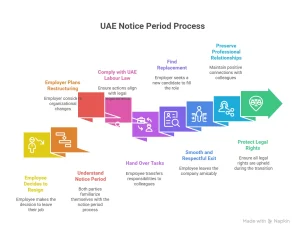Expecting a change in the UAE corporate world is constant. An employee planning to resign or an employer looking to restructure must understand the notice period process. This can save you from potential legal issues and unnecessary confusion.
The businesses become more agile, and employees become more mobile. In these circumstances, the notice period leads to a smooth and respectful exit. Preserve professional relationships and protect legal rights.
The blog post cuts through the complexity. It will give you a clear view of your obligations and entitlements during a job transition in the UAE.
What Is a Notice Period in the UAE?
The notice period is the timeframe an employee or employer must give before ending an employment contract. Designed to achieve fairness for both parties. Utilize that time to hand over tasks or find a replacement. The entire process should comply with the UAE Labour Law
The standard notice period ranges from 30 to 90 days. The duration depends on the contract terms. The MOHRE enforces these rules under the UAE Labour Law, Federal Decree-Law No. 33 of 2021.

Legal Provisions: What the Law Says
No idea what the UAE labor law says about the termination notice period, UAE? We have compiled the important details in the form of a table for better understanding:
| Article | Key Point |
| 117 | Both the employer and employee must give a minimum of 30 days’ notice for termination of an unlimited contract. |
| 118 | The employment contract remains valid during the notice period. Salary must be paid in full. The notice cannot be waived unless both parties agree. |
For daily wage workers, the termination notice period in the UAE varies. It could be 7 days for workers who have worked for 6 months to less than 1 year. 14 days for those who spent 1 to 5 years in the company, and 30 days for employees who completed 5 years in the respective organization.
Types of Notice Periods in UAE
The notice periods are further classified into types of contracts. The two contract types are:
- Unlimited Contracts
- Limited Contracts
For UnLimited Contracts:
In unlimited contracts, employers must give 30 calendar days of notice. Employees can resign for better opportunities with notice. Employers must justify the termination reason to avoid legal issues.
For Limited Contracts:
For limited contracts, the minimum notice is 30 days. The contract remains valid during the notice period. Compensation may be due under Article 43 if either party fails to serve the notice.
During Probation:
The maximum probation period is 6 months. The employer must give 14 days’ notice to terminate. Probation cannot be extended beyond six months.
Can the Notice Period Be Changed?
Yes, but with specific conditions. Both parties must agree to the change. The agreement must be written and signed. Verbal agreements are not legally binding.
Employers and employees can also agree to shorten or waive the notice period in specific cases, but only through mutual consent.
What Happens During the Notice Period?
| Expectation | Details |
| Job Duties | Continue normal work and hand over responsibilities |
| Communication | Stay in touch with managers and colleagues |
| Professional Conduct | Be punctual, participate actively, and maintain decorum |
Employees should treat the notice period like any other working period to maintain a good reference and avoid salary deductions. Following professionalism ensures a smooth exit
Payments and Compensation During a Notice Period
Employees are entitled to full salary during the notice period. They are eligible for end-of-service benefits and unused leave encashment if applicable. Employees are also entitled to a final settlement, which may include gratuity and pending bonuses or commissions
If the employer asks the employee to leave immediately, they must pay for the entire notice period. On the other hand, if the employee leaves early without cause, they may have to pay the employer for unearned days.
Step-by-Step Notice Period Process
The procedure of the notice period for both employees and employers is listed below:
For Employers:
- Provide formal written notice (email or letter)
- State the final working day clearly
- Arrange for handover and exit interviews
- Settle all dues before the last working day
For Employees:
- Resign with the intended last day
- Cooperate with HR for handover
- Clear dues and return company property
- Request an experience certificate or NOC
Employer vs. Employee Notice Period
Employee or employer, both need to know the essentials of the notice period on termination:
| Aspect | Employer | Employee |
| Standard Duration | 30–90 days | 30–90 days |
| Mode of Notification | Written | Written |
| Compensation for Short Notice | Required | Required |
Factors That Affect Notice Period Duration
Several elements influence the actual notice period, such as contract type (limited or unlimited), length of service, probation status, mutual agreements, and employment category (e.g., daily wage, full-time)
Immediate Termination Scenarios (No Notice)
Under Article 44 of the UAE Labour Law, termination notice period, employers may terminate employees without notice under these conditions:
- Falsification of documents
- Repeated poor performance after warnings
- Breach of safety protocols
- Theft or dishonesty
- Unauthorized absence for over 7 consecutive days
These scenarios allow termination without a notice period in the UAE. These actions are considered gross misconduct.
Arbitrary Dismissal: What to Watch Out For
Arbitrary dismissal refers to being terminated without a valid reason. It’s illegal in the UAE, and employees can file a complaint with MOHRE. Employees can claim up to 3 months’ salary as compensation. They can seek justice through labour courts if needed.
Best Practices for Employers
As an employer, you must consider some points to play it safe. Keep all termination and resignation records for proof. Follow due process to avoid legal trouble and respect employee rights and timelines. If needed, consider HR software to track notices and compliance
Best Practices for Employees
The employees are also required to resign with dignity and respect. They must complete handovers responsibly and avoid last-minute exits. Show maturity and maintain professionalism till the end.
Final Thoughts: Why It Matters
The notice period is the gateway to fairness and continuity. No matter if you’re parting ways on good terms or even facing a challenging exit. It is more than just a timeframe. The duration is a legal and professional bridge between your current and future opportunities.
UAE Labour Law adherence protects both parties and prevents disputes. Making this transition smooth and stress-free. The right preparation and a professional attitude a key.
Still confused about the termination notice period UAE? Why not get assistance from Emiratisation Nafis? Our support equips you with all the possible information regarding the process. Beneficial for both employees and employers. This means anyone can hire us to make their employment contract processes smoother.
FAQs for the Termination Notice Period UAE
Should an employee be dismissed without any notice?
Yes, the UAE Labor Law specifies that an employer can only terminate a worker without notice for serious misconduct.
What is the appropriate notice period for dismissing a worker in the UAE?
The employee’s contract indicates that the employer must give at least thirty days’ written notice, or may extend it to ninety days’ notice.
Does an employer need to pay throughout the notice period?
Yes, the company has to provide the employee their full wage and benefits during the notice period.



